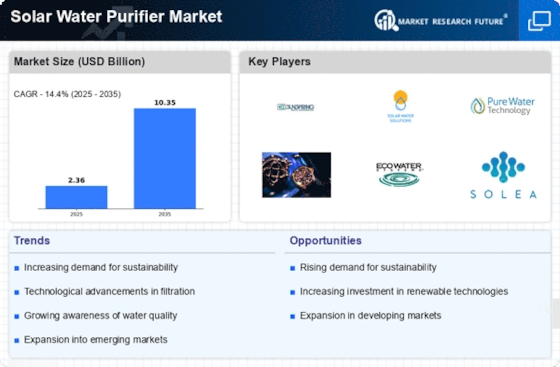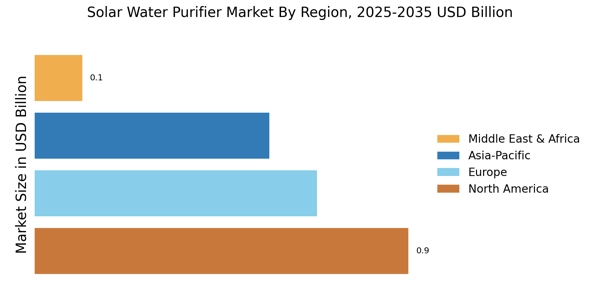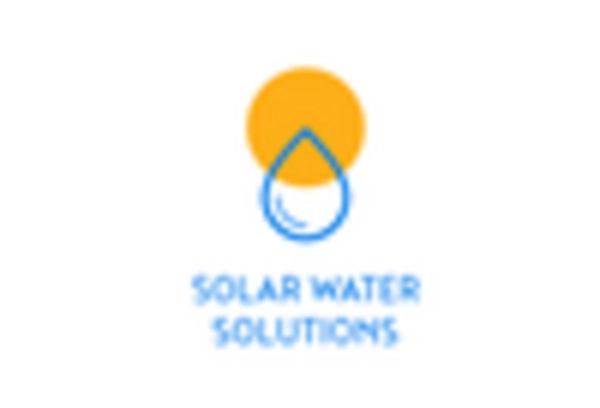Rising Water Scarcity
The increasing prevalence of water scarcity is a critical driver for the Solar Water Purifier Market. As populations grow and climate change exacerbates drought conditions, the demand for efficient water purification solutions rises. According to recent data, nearly 2 billion people currently live in water-stressed areas, which is projected to increase. This situation compels communities to seek sustainable alternatives, such as solar water purifiers, which utilize renewable energy to provide clean drinking water. The Solar Water Purifier Market is thus positioned to address this urgent need, offering solutions that are not only effective but also environmentally friendly. As awareness of water scarcity issues grows, the market for solar-powered purification systems is likely to expand, driven by both necessity and innovation.
Technological Innovations
Technological innovations are a driving force behind the growth of the Solar Water Purifier Market. Advances in solar technology, such as improved photovoltaic cells and energy-efficient purification methods, enhance the effectiveness and efficiency of solar water purifiers. These innovations enable systems to operate in diverse environmental conditions, making them suitable for a wider range of applications. Furthermore, the integration of smart technologies, such as IoT and remote monitoring, allows users to optimize their water purification processes. As these technologies evolve, they are likely to attract more consumers and businesses to the Solar Water Purifier Market, fostering a competitive landscape that encourages further advancements and adoption.
Increased Health Awareness
Growing health awareness among populations is a pivotal driver for the Solar Water Purifier Market. As individuals become more informed about the health risks associated with contaminated water, the demand for effective purification solutions intensifies. Waterborne diseases remain a leading cause of illness in many regions, prompting a shift towards safer drinking water options. The Solar Water Purifier Market is well-positioned to meet this demand, as solar purifiers not only provide clean water but also promote health and well-being. The rising emphasis on public health initiatives and education regarding water quality is likely to further propel the market, as communities seek reliable and sustainable solutions to safeguard their health.
Cost-Effectiveness of Solar Solutions
The cost-effectiveness of solar-powered technologies serves as a significant driver for the Solar Water Purifier Market. With the decreasing costs of solar panels and related technologies, the initial investment for solar water purifiers has become more accessible for households and communities. Reports indicate that the cost of solar energy has dropped by over 80% in the last decade, making solar water purification systems a financially viable option for many. This trend is particularly beneficial in regions where traditional energy sources are expensive or unreliable. As consumers and organizations seek to reduce operational costs while ensuring access to clean water, the Solar Water Purifier Market is likely to experience substantial growth, driven by the economic advantages of solar solutions.
Government Initiatives and Incentives
Government initiatives and incentives play a crucial role in driving the Solar Water Purifier Market. Many governments are increasingly recognizing the importance of sustainable water solutions and are implementing policies to promote the adoption of solar technologies. These initiatives may include subsidies, tax incentives, and funding for research and development in solar water purification. For instance, several countries have established programs aimed at enhancing access to clean water through renewable energy solutions. Such supportive measures not only encourage investment in solar water purifiers but also foster innovation within the industry. As governments continue to prioritize sustainability and public health, the Solar Water Purifier Market is expected to benefit from these favorable policies.


















